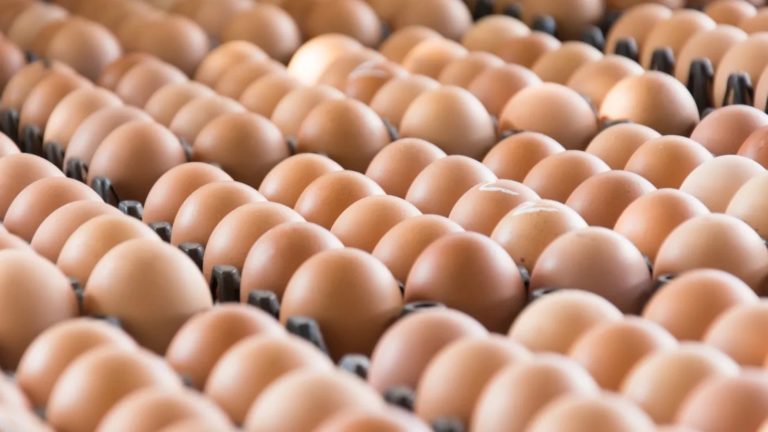Dad of the year here. I ascribe myself that coffee-mug moniker for many reasons, not the least because I subject my kids to conservative talk radio while they’re strapped like captives in their car seats. Never too early in nonage to seed the “Democrats bad, Republicans also-bad-but-not-as-crazy” message.
The other morning while driving my youngest to daycare, we listened to the hair-plug-hawking erudition of Larry O’Connor, who was sounding off on a Washington Post editorial about the price of everyone’s favorite breakfast staple. Authored by anti-Trumper Megan McArdle, the piece was provocatively titled, “Why eggs are cheaper than you think.”
McArdle rehashed an old theory, one long posited by free-market economists like Ludwig von Mises and Murray Rothbard. In an nuteggshell: Think living standards are rough now? Consider the barrenness of material life a hundred years ago. Indoor plumbing? Just for the super-rich. Electricity? Ditto for the well-heeled. Potable water? How much did you lug from the well today? Fresh food? How much did you harvest from the family plot? Automobiles? Henry Ford is still working out the kinks on the assembly line. A hot shower? Better go bathe in the sun. Air conditioning? Better go bathe in the snow. Internet? Ever hear of this antique called a “book”? Oh, you can’t read? Well then how are you even reading this article?
You get the point. “If you can’t help cringing when you see the cashier ring up eggs that cost twice as much as they did a year ago, it might help to remember that however poor you feel, your ancestors would have taken one look at your grocery cart and declared you rich beyond their dreams,” McArdle argued.
The column was a coup in egging on conservative hate. O’Connor lambasted McArdle’s tone-deafness in suggesting that a doubling of Egg-Land’s Best’s price was still a bargain. He wasn’t the only crymmentator to fall for the con-bait. The conserviral ecosystem of sites all weighed in, from Daily Wire to Twitchy to Gateway Pundit. (Hyperlink on the latter withheld for the sake of the reader’s good sense and anti-virus protection.) Fox News ran a rage-read report tallying the Twitter flack it received. Some standouts: Mises Institute fellow Peter St. Onge: “WaPo: quit complaining about eggs, it was worse in 1905. When the only thing you got is favorable comparisons to 130 years, I guess that’s what you go with.”; Washington Examiner blogger Ian Haworth mimed the advice, tweeting, “‘Can’t afford food? Well your ancestors were hungry too, so shut the f*** up!'”; Twitter toughie Jesse Kelly bromidically invoked Orwell, declaring “The sky is green.”
All of this conservative clucking is so simple as to miss McArdle’s message. Unlike her internet interlocutors, she adheres to Aristotle’s dictum about intelligence being the ability to balance two opposing ideas at the same time.
Eggs, despite their airy blandness, were once considered a luxury indulgence. And over time, with amped up production, we’ve been able to produce so many that their relative price has plummeted. McArdle calculates: “In 1905, an average male factory worker older than 16 took home $11.16 a week, enough to buy about 41 cartons of eggs. Today, the median man earns $1,176 a week, enough to buy more than 275 cartons of eggs, even at today’s elevated prices.”
Hip, hip hurrah, right? Two cheers for economic progress! (One cheer withheld due to AI’s inability to not commit human genocide.) More eggs, more money, more American happiness! Who could argue with that? Doesn’t the right worship at the cheap, particle-board-composed altar of market efficiency?
Not when there’s a Democratic president to demonize, obviously. The price of eggs started spiking in the latter half of last year thanks to a deadly avian flu strain. Combined with inflation that was effecting food-price jumps, paying double for a Spanish omelet was inconvenient. But because of the economy’s self-correcting immune system, the cost trajectory for a dozen white ones is starting to U-turn. Wholesale egg prices are dropping. Markups on grocery store shelves will soon follow. The yolk of high egg prices is lessening. The Liver King can now devote more of his dough to HGH, which should help millions of phone-glued incels sleep easier.
McArdle still struck a nerve with her obviously true data comparison—or maybe it’s more accurate to say she “triggered” the right. Conservatives not only should but must consider the great sweep of time. It’s a positive attribute, not normative. The Burkean adage about society as a partnership between the living, the dead, and the future-born means putting great deferential weight on the past. You can’t conserve what you don’t consider.
Recognizing we’ve come a long way from outhouses and washboards isn’t a surrender to moderately high egg prices. Nor does it excuse the left, which would happily have us forget our ancestors’ struggles in order to construct a new utopia based upon an abstract, and usually murderous, equality. Economist Don Boudreaux used to collate the cost of everyday goods in mid-century Sears and Montgomery Ward catalogs. He consistently found that we pay less for modern staples than we did just a few decades ago, even when accounting for inflation.
Perspective matters. Paying twice as much for eggs seems like a hardship now, but not compared with what your grandparents paid. Call it the Lovejoy Appreciation Test: if you think you’re paying a lot for something, please think of the grandparents!
And give a little thanks to Salk and Sabin while you’re counting your budgetary blessings. Paying extra for eggs is hard when polio snatches you from the crib.














[…] was the “Great” one of Dust Bowl infamy. But we’re in the throes of a newer, less material-deprived, depression. So-called “deaths of despair” are rising. Opioid overdoses are at a record high. […]